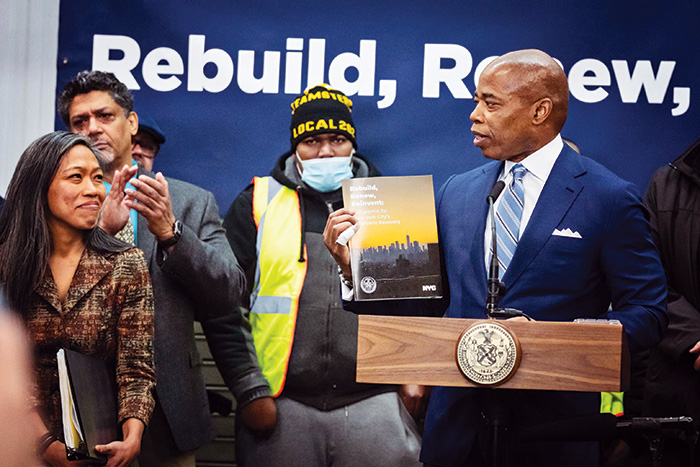Photo Courtesy of Ed Reed/Mayoral Photography Office
Mayor Adams said that the City’s recovery from the pandemic “cannot and will not be about going back to the way things were — we are going to rebuild, renew, and reinvent our city and our economy for today, tomorrow, and generations to come.”
By Forum Staff
Mayor Eric Adams on Thursday released “Rebuild, Renew, Reinvent: A Blueprint for New York City’s Economic Recovery,” which outlines his vision for the city’s economic recovery and the future of the city’s economy. The blueprint, according to Adams, specifically aims to accelerate the return to pre-pandemic employment levels, while simultaneously laying the foundation for the city’s economic future — addressing historic injustices and reimagining outdated ways of doing business.
Among the strategies outlined in the blueprint are more than 70 concrete actions that will help realize the mayor’s goal of rebuilding, renewing, and reimagining the city’s economy. The administration will:
- Assemble a “New New York” blue-ribbon panel, convened by Adams and Gov. Kathy Hochul, to re-envision business districts, invest in the workforce, and stimulate economic growth by engaging some of the most visionary leaders in business, labor, academia, nonprofit, and philanthropy;
- Launch the NYC Strategy for Equity and Economic Development (SEED) Fund, a new equitable capital planning framework to invest city resources into neighborhood needs in ways that address historic disinvestment, immediate public health and safety issues, and growing climate risks, while creating jobs and spurring economic growth;
- Provide small businesses much-needed relief — cutting opening times in half, suspending the city’s 25 percent surcharge on liquor licenses, streamlining inspections, reforming licensing requirements, providing back-office support and free tax preparation, improving language access, and helping small businesses expand their digital footprints;
- Launch the Small Business Opportunity Fund to meet the financing needs of historically underserved local businesses and entrepreneurs, addressing critical gaps in access to capital;
- Strengthening our commercial corridors across the five boroughs by investing in small Business Improvement Districts, merchant associations, and public realm improvements;
- Tackle public safety and quality-of-life concerns in commercial corridors and launch a Public Realm Working Group to execute a holistic strategy of coordinated initiatives and programs in our public spaces;
- Expand the city’s tourism marketing campaign to show the world that New York City is open, vibrant, and ready to welcome visitors again;
- Double down on growing the life sciences industry, with a focus on expanding into new sub-industries and building the talent pipeline of local New Yorkers;
- Jumpstart the local, green economy and affirm New York as a global leader in just solutions to the climate crisis with the creation of a new, state-of-the-art education and research institution on Governors Island, which will work to identify equitable urban climate solutions and drive growth of accessible green jobs;
- Build an equitable cannabis industry from the ground up, by offering financial support and technical assistance to help entrepreneurs launch their businesses and launching a broad-based community engagement effort to make New Yorkers aware of opportunities to participate in the industry;
- Protect and strengthen New York City’s creative economy with the creation of a new, one-of-a-kind cultural district on Governors Island and a “Culture at Risk” response team to protect New York City’s creative businesses and neighborhood institutions;
- Protect workers’ rights by raising and enforcing labor standards for app-based delivery workers and adding new city resources focused on protecting the rights of home care aides, nannies, house cleaners, and other domestic and care workers; and “New York City’s recovery cannot and will not be about going back to the way things were — we are going to rebuild, renew, and reinvent our city and our economy for today, tomorrow, and generations to come,” Adams said.

